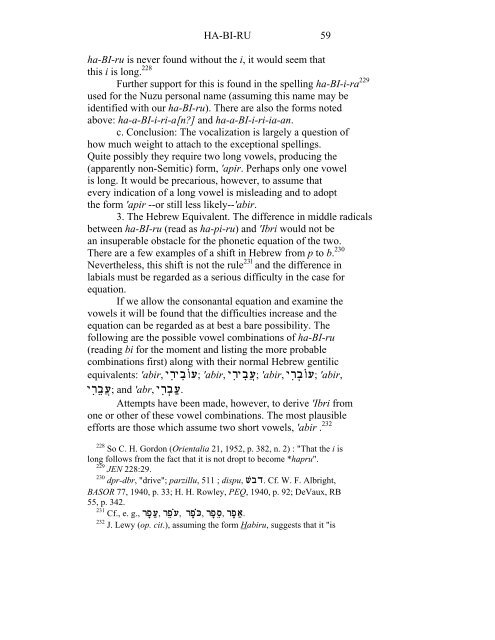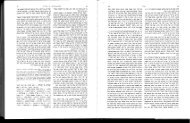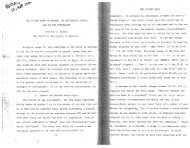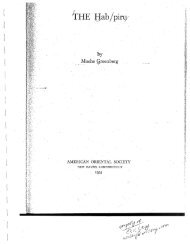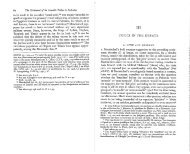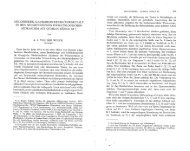The Ha-Bi-Ru--Kin or Foe of Israel? - Gordon College Faculty
The Ha-Bi-Ru--Kin or Foe of Israel? - Gordon College Faculty
The Ha-Bi-Ru--Kin or Foe of Israel? - Gordon College Faculty
Create successful ePaper yourself
Turn your PDF publications into a flip-book with our unique Google optimized e-Paper software.
HA-BI-RU 59<br />
ha-BI-ru is never found without the i, it would seem that<br />
this i is long. 228<br />
Further supp<strong>or</strong>t f<strong>or</strong> this is found in the spelling ha-BI-i-ra 229<br />
used f<strong>or</strong> the Nuzu personal name (assuming this name may be<br />
identified with our ha-BI-ru). <strong>The</strong>re are also the f<strong>or</strong>ms noted<br />
above: ha-a-BI-i-ri-a[n?] and ha-a-BI-i-ri-ia-an.<br />
c. Conclusion: <strong>The</strong> vocalization is largely a question <strong>of</strong><br />
how much weight to attach to the exceptional spellings.<br />
Quite possibly they require two long vowels, producing the<br />
(apparently non-Semitic) f<strong>or</strong>m, 'apir. Perhaps only one vowel<br />
is long. It would be precarious, however, to assume that<br />
every indication <strong>of</strong> a long vowel is misleading and to adopt<br />
the f<strong>or</strong>m 'apir --<strong>or</strong> still less likely--'abir.<br />
3. <strong>The</strong> Hebrew Equivalent. <strong>The</strong> difference in middle radicals<br />
between ha-BI-ru (read as ha-pi-ru) and 'Ibri would not be<br />
an insuperable obstacle f<strong>or</strong> the phonetic equation <strong>of</strong> the two.<br />
<strong>The</strong>re are a few examples <strong>of</strong> a shift in Hebrew from p to b. 230<br />
Nevertheless, this shift is not the rule 23l and the difference in<br />
labials must be regarded as a serious difficulty in the case f<strong>or</strong><br />
equation.<br />
If we allow the consonantal equation and examine the<br />
vowels it will be found that the difficulties increase and the<br />
equation can be regarded as at best a bare possibility. <strong>The</strong><br />
following are the possible vowel combinations <strong>of</strong> ha-BI-ru<br />
(reading bi f<strong>or</strong> the moment and listing the m<strong>or</strong>e probable<br />
combinations first) along with their n<strong>or</strong>mal Hebrew gentilic<br />
equivalents: 'abir, yriybiOf; 'abir, yriybifE; 'abir, yrib;Of; 'abir,<br />
yribefE; and 'abr, yrib;fa.<br />
Attempts have been made, however, to derive 'Ibri from<br />
one <strong>or</strong> other <strong>of</strong> these vowel combinations. <strong>The</strong> most plausible<br />
eff<strong>or</strong>ts are those which assume two sh<strong>or</strong>t vowels, 'abir . 232<br />
228 So C. H. G<strong>or</strong>don (Orientalia 21, 1952, p. 382, n. 2) : "That the i is<br />
long follows from the fact that it is not dropt to become *hapru".<br />
229 JEN 228:29.<br />
230 dpr-dbr, "drive"; parzillu, 511 ; dispu, wbd. Cf. W. F. Albright,<br />
BASOR 77, 1940, p. 33; H. H. Rowley, PEQ, 1940, p. 92; DeVaux, RB<br />
55, p. 342.<br />
231 Cf., e. g., rpAfa, rpefo, rpAKo, rpAse, rpAxa.<br />
232 J. Lewy (op. cit.), assuming the f<strong>or</strong>m <strong>Ha</strong>biru, suggests that it "is


